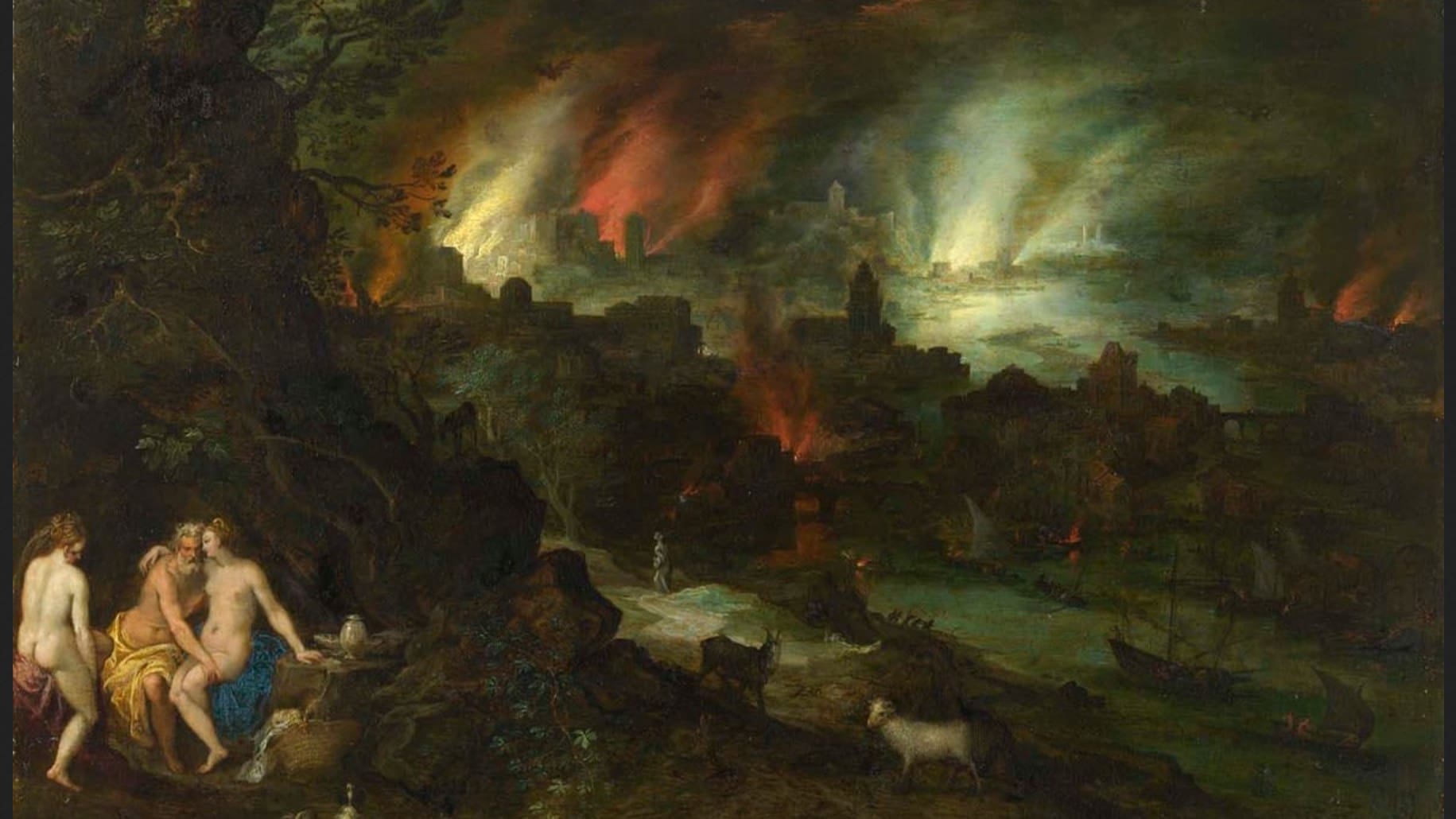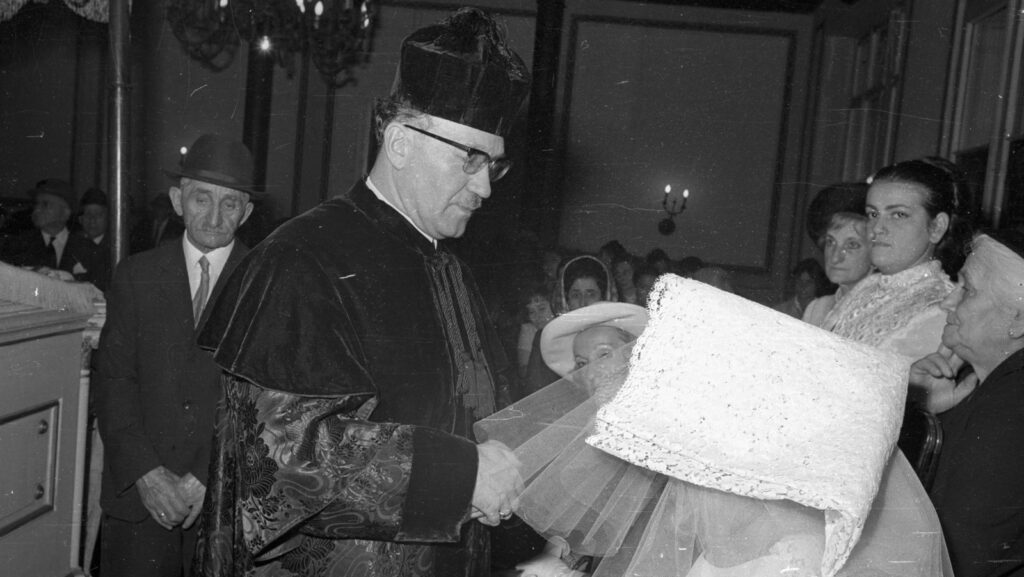‘The kind of homosexuality that I would define as a partnership, a loving relationship, which I am now living in, is unknown to the Bible,’ András Hodász* said on Friday [20 October]. A few thoughts on what the Scriptures say about homosexuality, whether Jesus was silent on the issue, and whether God’s views change. An article by Mandiner senior staff writer, acclaimed foreign affairs journalist Tamás Maráczi.
‘When the sacred text talks about homosexuality not being okay, that does not necessarily refer to the relationships gay persons are living in today,’ András Hodász said at a public meeting in Kolozsvár (Cluj-Napoca, Romania), on Friday, 20 October, according to Transylvanian news website Transtelex. Earlier, in an interview with Hungarian online publication Valaszonline.hu, the former Catholic priest, who came out as gay in July, also said that ‘Jesus, for example, does not talk about this topic at all’ and that ‘often the emphasis is in the wrong place, for example in terms of what is highlighted and what is forgotten about the teachings of the Bible’.
Following Hodász’ announcement about his sexual orientation [on Instagram], Catholic theologian Rita Perintfalvi suggested on her Facebook page that other hiding gay churchmen should also ‘come out and cleanse the churches…of homophobia’. Two years earlier, she had written these words of recommendation in a book she had given to Hungarian Gergely Homonnay**: ‘If my Master, who is yours, too, were alive today, he would go to the Pride Parade, would lead the pride march, and would say that love knows no discrimination.’
The above claims are debatable, and in this article I would like to explain why. First, a few clarifications: since both András Hodász and Rita Perintfalvi are public figures with theological degrees and are Christian influencers, their words have a special weight and religious significance, that is why I would like to reflect on them in this form—I am no theologian and this is only the opinion of a self-taught Bible reader; as the son of a psychologist, I am aware of the complex psychological–sociological layers of homosexuality, thus, I will not pass judgment on people. And since this is a politicized issue, I would also like to make it clear that this writing is not an attempt at character assassination—it is not about persons, not even about gay people in general, but about a matter of principle:
to understand what God’s view of man’s sexual orientations may be by examining the deep layers of the Scriptures.
As a basic principle: for non-believers, this analysis will only be fiction, since if the Scriptures have no divine authority over them, it is just one view among many on the issue of homosexuality; regarding Christians, however, I take it as a starting point that we agree that the Scriptures are the body of texts that the Church has recognized as the revelation and the message of Almighty God since the first century.
References to Homosexuality in the Old Testament
Chronologically speaking, the first reference is in the creation story. God created man male and female, that is, he created two biological sexes, and it is also clear from the text that there are specific reasons for this: the complementary union of the two different sexes in a loving relationship, as well as the procreation of offspring, the perpetuation of the human race, and the continuation of creation. (‘Therefore a man shall leave his father and his mother and hold fast to his wife, and they shall become one flesh.’ Gen 2:24; ‘So God created man in his own image, in the image of God he created him; male and female he created them. And God blessed them. And God said to them, “Be fruitful and multiply and fill the earth and subdue it…”’ Gen 1:27–28).
The text explicitly states that it is a man and a woman who become one,
and it is this intimacy that is ‘blessed’ by God, and it is as the fruit of this physical (sexual)–spiritual communion that they can fulfil the Creator’s desire that they be ‘be fruitful and multiply’.
The Book of Genesis also tells the story of the Dead Sea cities of Sodom and Gomorrah, in which two angels in the guise of men arrive in Sodom, whereupon the city is in an uproar, and Lot the host tries to protect his guests in his house (‘But before they lay down, the men of the city, the men of Sodom, both young and old, all the people to the last man, surrounded the house. And they called to Lot, “Where are the men who came to you tonight? Bring them out to us, that we may know them.”’ Gen 19:4). Translated as ‘know’, the original word ‘yada’ (Hebrew) means ‘sexual act’, i.e. the men of Sodom wanted to have sexual intercourse with the two visiting men.
God’s judgment, as is known, eventually reached the two cities, and the chapter’s antecedents reveal that many of the local inhabitants had long been suffering because of the sins of the settlements, and the two angels had come to investigate this. (An eerily similar case, incidentally, occurred later, in the time of the Jewish judges, in the city of Gibeah, as described in Judges 19:16–25.
However, gender theology argues that Sodom’s sin that provoked God’s judgment was not homosexuality, but attempted rape. Nevertheless, other biblical texts show that it was not a specific crime but a long-standing lifestyle that exhausted the Creator’s patience. An explanatory quotation from the New Testament says the following: ‘…just as Sodom and Gomorrah and the surrounding cities, which likewise indulged in sexual immorality and pursued unnatural desire, serve as an example by undergoing a punishment of eternal fire.’ Jude 1:7—the original Greek term in the passage ‘ekporneusasai’ means sexual immorality and perversion, not rape.
In the Old Testament, we also find an explanation of Sodom’s problem: ‘Behold, this was the guilt of your sister Sodom: she and her daughters had pride, excess of food, and prosperous ease, but did not aid the poor and needy. They were haughty and did an abomination before me. So I removed them, when I saw it.’ Ezekiel 16:49–50—selfishness, hedonism, and a total lack of empathy with the downtrodden characterized the locals. Besides, in the last sentence, there is another attribute: ‘abomination’—the original Hebrew term ‘toebah’ means a variety of serious moral sins but in particular sins of spiritual or physical ‘substitution’, such as idolatry or a man having sex with another man instead of his wife.
The same Hebrew word can also be found in the oft-quoted Torah phrase: ‘You shall not lie with a male as with a woman; it is an abomination.’ Lev 18:22; ‘If a man lies with a male as with a woman, both of them have committed an abomination; they shall surely be put to death; their blood is upon them.’ Lev 20:13—namely, God mentions this sexual intercourse among the exhaustive sexual sins detailed in the Law, and it was not an accidental slip of the tongue on the part of the Lord, for He mentions it twice, repeatedly, emphasizing the moral classification of the issue.
In the summary of the Law (Deuteronomium), the word ‘toebah’ is used again in the following verse: ‘A woman shall not wear a man’s garment, nor shall a man put on a woman’s cloak, for whoever does these things is an abomination to the Lord your God.’ Deut 22:5—
all these examples show that the Creator does not like it when those he created change the order of sexuality that He has established.
The Old Testament also pairs the term ‘abominable sin’ with the actions of ‘male fornicators’ or ‘sodomites’ (appearing in several English translations) (1 Ch 14:24, 1 Ch 15:12, or 2 Ch 23: 7), while the Jewish versions of these biblical passages rather condemn the practice of male homosexual prostitution as a remnant of the Canaanite cults, i.e. they are not clear evidence for a biblical condemnation of homosexuality as a lifestyle.
For that matter, the argument of gender theology tries to project this latter approach onto the content of the taxative verses, relativizing the moral judgment they contain, that is, it tries to make it seem as if God condemned only the cultic homosexual prostitution of that time, and not homosexual attraction or lifestyle.
Is the Old Testament Still Valid for Christians?
The answer is given by Jesus himself: yes. ‘Do not think that I have come to abolish the Law or the Prophets; I have not come to abolish them but to fulfil them.’ Mt 5:17; ‘But it is easier for heaven and earth to pass away than for one dot of the Law to become void.’ Lk 16:17 Jesus’ astonishing debates with the Jewish high priests and expounders of the law are interesting precisely because He did not appear as the founder of a new religion or a rabbi teaching a new Judaic theology. He claimed to be the Son of God, the Messiah, and therefore claimed to be the Word (Jn 1:14), that is, the communicator of the Law, moreover, that all things in the universe came into being through Him (Jn 1:3)—it was for this blasphemy that the Jewish leaders asked Pilate to execute Him.
According to Judaism, Jesus was a blasphemer and had to be executed according to the Law—unless He was telling the truth, and He really was the Messiah. Christians are the ones who believe this; however, it is important to note that even Jesus’ death was caused by the Law, and even in death He remained obedient to the Law—that is what became redemption: He suffered the penalty of the Law without sin to exempt those who are guilty but believe in His substitutionary atonement (and resurrection). Therefore, the disciples (Christians) relate to the Law just like the Master: Jesus fulfilled the Law of God and paid the penalties it prescribed, but did not abolish the divine precepts themselves. Christians are no longer under the Law, but in Christ, however, those who live in Christ no longer want to live in sin, that is, when they freely follow the Holy Spirit with a converted heart, they also fulfil the Law.
To give a concrete example, Jesus did not tell the witnesses not to stone the woman caught in adultery according to the Law, he merely added a condition (‘Let him who is without sin among you be the first to throw a stone at her.’ Jn 8:7), nor did he relativize the sin of adultery (he only warned the woman to sin no more)—the woman was saved, but the moral weight of the Law remained. This is an example of the beautiful demonstrations of the Gospel.
So Was Jesus Silent on the Issue of Homosexuality?
Many, including most recently András Hodász, point out that there is no specific example in the Gospels of Jesus condemning homosexuality. The answer is, however, that Jesus was not silent on this matter. ‘But it is easier for heaven and earth to pass away than for one dot of the Law to become void’—that is, Jesus did not abolish the Law, He accepted its precepts as binding even on Himself, without being exhaustive: he paid the tribute money, asked the lepers he healed to go up to the church to perform the purification ceremony, went up regularly to Jerusalem for the Pilgrimage Festivals, and so on. ‘…I have kept my Father’s commandments and abide in his love.’ Jn 15:10
If Jesus is the Christ, that is, the Son of God, who is ‘one with the Father’ Jn 10:30, He is also in agreement with the Law as given by God. If the Law calls homosexuality a sin, so does Jesus. As we have seen above, the Law lists many ‘abominable sins’, some of which Jesus specifically mentions (such as adultery) and some of which he does not (such as incest, sexual intercourse with animals, etc.)—but it does not follow that he did not condemn these sins in the same way. Homosexuality is included in the Law’s (the Torah’s) taxative list of sins, and therefore
it would be difficult to conclude that Jesus condemns all the other sins that God condemns, except homosexuality.
This is also supported by the historical–sociological context of the time: in Jesus’ day, all branches of Judaism prohibited homosexuality, precisely based on the precepts of the Law.
Jesus confirmed the truths of the Law in the field of sexuality, too. When some interpreters belonging to the sect of the Pharisees asked Him about the possibility of divorce, Jesus indicated that the Law was in force: the union of one man and one woman is marriage, and ‘what therefore God has joined together, let not man separate.’ Mt 19:6 In the Sermon on the Mount, He even specifically tightened the Mosaic interpretation on the question of sexual relations: not only the one who performs the sexual act commits adultery, but also the one who looks upon another man’s wife with the desire to commit adultery (Mt 5:27–28).
Going even further, Jesus also tells us what desires and passions make a man unclean. ‘What comes out of a person is what defiles him. For from within, out of the heart of man, come evil thoughts, sexual immorality, theft, murder, adultery…’ Mk 7:20–21—the Greek word for ‘sexual immorality’ in the passage is ‘porneiae’, which is plural for all kinds of sexual immorality; it would be hard to believe that Jesus did not include homosexuality in such a collective term, similarly to the way it is included in the summary list of the Law.
Warning Passages in the New Testament
There is more concrete proof of Jesus’ conviction than the above: the above-mentioned term ‘porneia’ (expository dictionaries give the word as meaning ‘to give up sexual purity’) can also be found, for example, in Rom 1 or 1 Cor 6, in which some passages clearly and explicitly refer to homosexual sins:
‘For their women exchanged natural relations for those that are contrary to nature; and the men likewise gave up natural relations with women and were consumed with passion for one another, men committing shameless acts with men and receiving in themselves the due penalty for their error.’ Rom 1:26–27— these are fairly clear words.
The Apostle Paul also mentions the cause and nature of homosexuality in this chapter. According to him, the problem is twofold: on the spiritual level, many people have exchanged the worship of God for the worship of idols and creatures, and therefore God has allowed their minds and hearts to be ‘darkened’ and their evil desires to be intensified; this is where the physical level comes in, where some of these people have ventured into the realm of homosexual adventures in the exercise of sexual desires—that is, according to the Apostle Paul, out of disrespect for the Creator comes disrespect for the order in the created world. The original Greek expression translated as ‘contrary to nature’ in English also refers to this attitude.
‘Or do you not know that the unrighteous will not inherit the kingdom of God? Do not be deceived: neither the sexually immoral, nor idolaters, nor adulterers, nor men who practice homosexuality…’ 1 Cor 6:9—these are even harsher words, for they show the true weight, or rather the stakes, of these activities: those who engage in such a lifestyle, according to Paul (or the Holy Spirit who inspired him), exclude themselves from the kingdom of God. (In the Hungarian version, the old-fashioned words of Calvinist preacher and author of the first complete Hungarian translation of the Bible Gáspár Károli refer to two separate homosexual roles: the origin of the term ‘pulya’ [chicken-hearted or cowardly man] is the Greek word ‘malakoi’, meaning a feminine male, specifically the male who plays the female role in a homosexual relationship, while the word ‘férfiszeplősítő’ [abuser or a man who lies with men] is the Greek equivalent of ‘arsenokoitai’, meaning a gay partner who plays the male role.)
However, gender theology tries to present these passages as if it were not a sexual orientation that God objects to,
only the two improper attitudes named in the verses: gay prostitution and violent homosexual relations, i.e. as if He had not issue with homosexual relations committed in love.
In 1 Tim 1:9–10, Paul lists the sins committed by people who ‘disregard’ the Law, including two of the terms mentioned above, ‘pornois’ (sexually immoral) and ‘arsenokoitais’ (homosexuals). But to not only cite just Paul, the Apostle Peter also writes on the subject: ‘…he rescued righteous Lot, greatly distressed by the sensual conduct of the wicked.’ 2 Peter 2:7. As we have already written above, the inner tension in Sodom was caused by the homosexual lifestyle of the local men. The Greek phrase used by Peter expresses that Lot was tormented by the ‘sensual conduct’ of his fellow citizens—in other words, the Apostle Peter calls homosexuality a lifestyle condemned by the Law.
Finally, let us examine another New Testament quote, this time from the Apostle James. The Christian leaders in their meeting in Jerusalem agreed that Christians from a non-Jewish background should be required to keep only four of the commandments of the Law: ‘…but should write to them to abstain from the things polluted by idols, and from sexual immorality, and from what has been strangled, and from blood.’ Acts 15:20. Here, the third term is also ‘porneia’ in the original text, which, as we have already established, includes all the sexual immoralities of the age, including homosexuality, as listed in the Law. Therefore, in summary, we may state that the apostles, in unity with one another, exhorted the followers of Christ not to engage in a homosexual lifestyle as Christians.
Libertines and Legalists
Finally, after a review of the above verses, let me conclude with a final thought. In the debate on this subject, two extreme Christian positions can be observed, which, in the light of the above biblical principles, are not really Christian views.
The first is the lenient view, which calls for the acceptance of homosexual people and homosexual lifestyles in the name of love. All men are free to do as they please—so far this approach is Christian, but there is an important principle that is left out of it: Christians no longer live by their own standards but by Christ’s, and since Jesus did not abolish the Law, the divine standards of morality, and therefore of sexuality, do not change with time or the spirit of the age.
The other is the legalistic view, which condemns homosexual lifestyles and homosexual people as well in the name of truth. There is an objective divine standard that calls homosexuality a sin (‘hamartia’ = misdirection)—so far this is a Christian approach, but here too is an important principle that the condemners forget: Jesus not only condemned sin but at the same time considered it so important to save sinners that he gave his own life for them.
To sum up: Jesus would not go to a Pride Parade, just as he would not party with Herod,
but he would sit down to talk with gay people who are open to the Gospel, just as he dined with tax collectors and prostitutes.
He condemned sin (which killed Him on the cross) but loved sinners (whom He saved on the cross).
*András Hodász is a former Roman Catholic priest. He came out as gay earlier this summer, is now working as a barista, and is also a commentator and columnist for left-liberal media outlets.
**Gergely Homonnay was an openly gay Hungarian writer, journalist, and teacher, as well as an activist of the left-wing Democratic Coalition party. He died in still unclarified circumstances on New Year’s Day in Rome, Italy in 2022.
Click here to read the original article.








